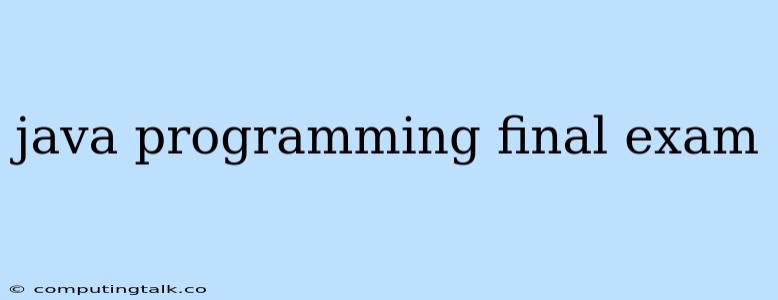The Java programming final exam is a crucial assessment that tests your understanding and mastery of the Java programming language. It is designed to evaluate your ability to apply the concepts and principles you've learned throughout the course. To prepare effectively for this exam, it's essential to have a solid foundation in the key areas covered in your curriculum.
What are the common topics covered in a Java programming final exam?
Java programming final exams typically cover a wide range of topics, including:
- Fundamentals of Java:
- Data types (primitive and reference types)
- Operators (arithmetic, relational, logical, bitwise)
- Control flow statements (if-else, switch, for, while, do-while)
- Arrays
- Strings
- Methods
- Classes and Objects
- Object-Oriented Programming (OOP) Concepts:
- Encapsulation
- Inheritance
- Polymorphism
- Abstraction
- Interfaces
- Exception Handling:
- Try-catch blocks
- Throw and throws keywords
- Custom exceptions
- Input/Output (I/O):
- File handling (reading and writing)
- Console input and output
- Streams
- Collections Framework:
- List, Set, Map interfaces
- ArrayList, LinkedList, HashSet, HashMap classes
- Generics:
- Generic classes and methods
- Concurrency:
- Threads
- Synchronization
- Multithreading
- Networking:
- Sockets
- Client-server communication
- Other Advanced Topics:
- JDBC (Java Database Connectivity)
- JavaFX (graphical user interfaces)
- Java EE (enterprise edition)
How can I prepare for my Java programming final exam?
Here are some effective tips for preparing for your Java programming final exam:
- Review your course materials: Start by thoroughly reviewing your textbook, lecture notes, and any other study materials you have access to. Make sure you understand all the key concepts, definitions, and syntax.
- Practice coding problems: The best way to solidify your understanding of Java programming is to practice solving coding problems. Work through exercises and past exam questions to get familiar with different problem-solving techniques.
- Utilize online resources: There are many valuable online resources available to help you learn and practice Java programming. Websites like HackerRank, LeetCode, and Codewars offer coding challenges and practice problems that can be helpful.
- Seek help from your instructor or TA: Don't hesitate to reach out to your instructor or teaching assistant if you have any questions or need clarification on specific topics. They can provide valuable guidance and support.
- Get enough sleep and eat healthy: Make sure you're well-rested and nourished before the exam. This will help you stay focused and alert during the test.
What are some common Java programming final exam questions?
Java programming final exams often include a mix of multiple-choice, true/false, short answer, and coding questions. Here are some examples of common questions:
- Multiple-choice:
- What is the correct syntax for declaring a variable in Java?
- Which of the following data types is used to store a decimal number?
- What is the purpose of the "this" keyword?
- True/false:
- Java is a compiled language.
- An abstract class can be instantiated.
- The "finally" block is always executed, even if an exception is thrown.
- Short answer:
- Explain the difference between a class and an object.
- What is the role of a constructor in Java?
- Describe the concept of inheritance in OOP.
- Coding questions:
- Write a program to find the sum of all even numbers between 1 and 100.
- Implement a class that represents a bank account with methods for deposit, withdrawal, and checking the balance.
- Create a program that reads a file and prints its contents to the console.
Common Errors to Avoid During the Exam
Here are some common errors students make during their Java programming final exams:
- Syntax errors: Double-check your code for typos and ensure correct syntax.
- Logical errors: Carefully think through your logic and test your code to make sure it produces the desired output.
- Runtime errors: Be mindful of potential exceptions and handle them gracefully.
- Time management: Allocate time wisely to answer all questions, even if you encounter challenging ones.
- Not reading the instructions carefully: Always read the instructions thoroughly before answering any question.
What are some tips for answering coding questions on the exam?
- Break down the problem: Divide the problem into smaller, more manageable parts.
- Write pseudocode: Before writing actual Java code, write pseudocode to outline the steps and logic involved.
- Test your code: Use the provided test cases or create your own to test your code and ensure it produces the expected output.
- Comment your code: Add clear comments to explain your logic and make your code more readable.
Conclusion
The Java programming final exam is a significant milestone in your learning journey. By thoroughly reviewing your course materials, practicing coding problems, and staying organized, you can prepare effectively and perform well on the exam. Remember to manage your time wisely, avoid common errors, and seek help from your instructor or TA if needed.
